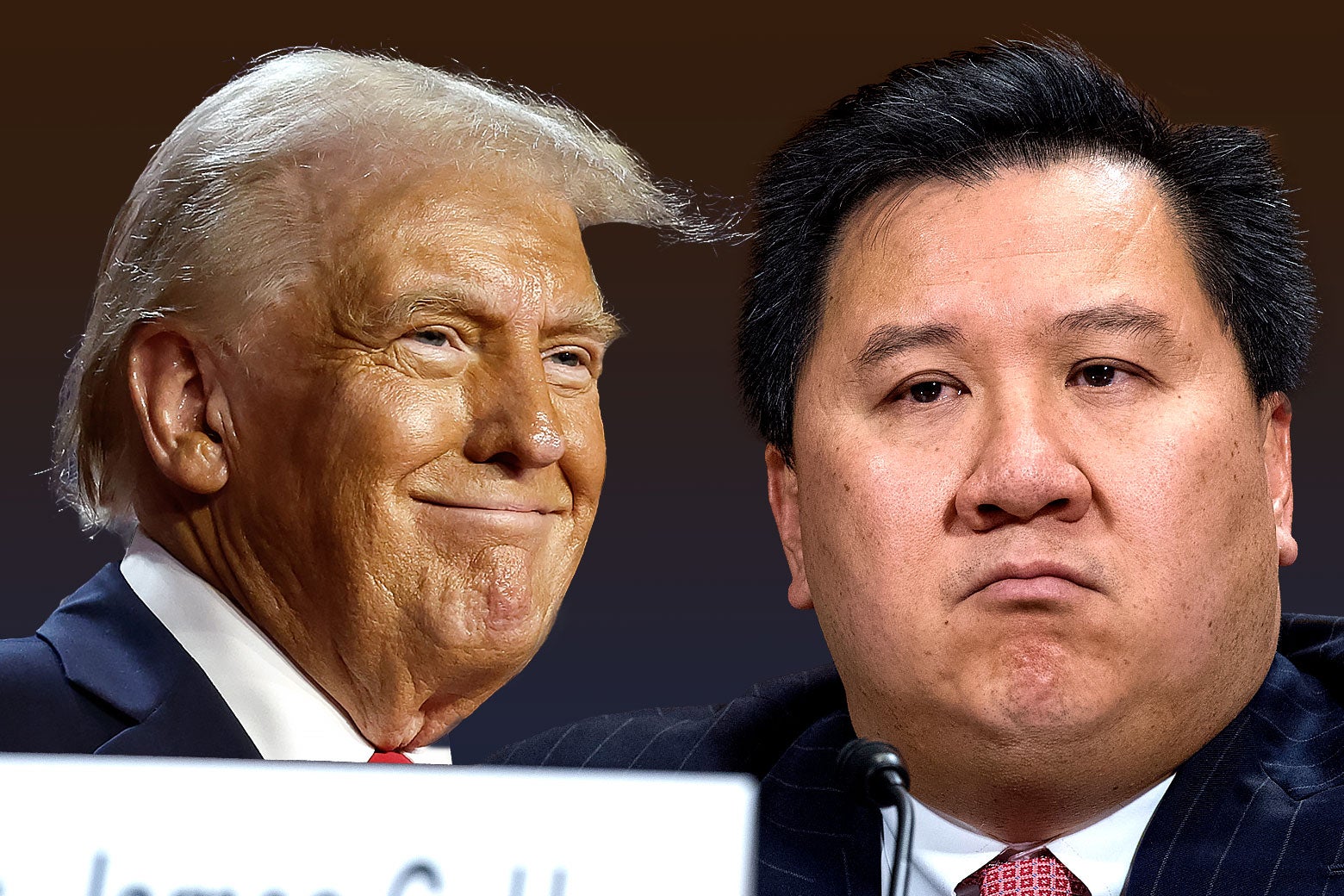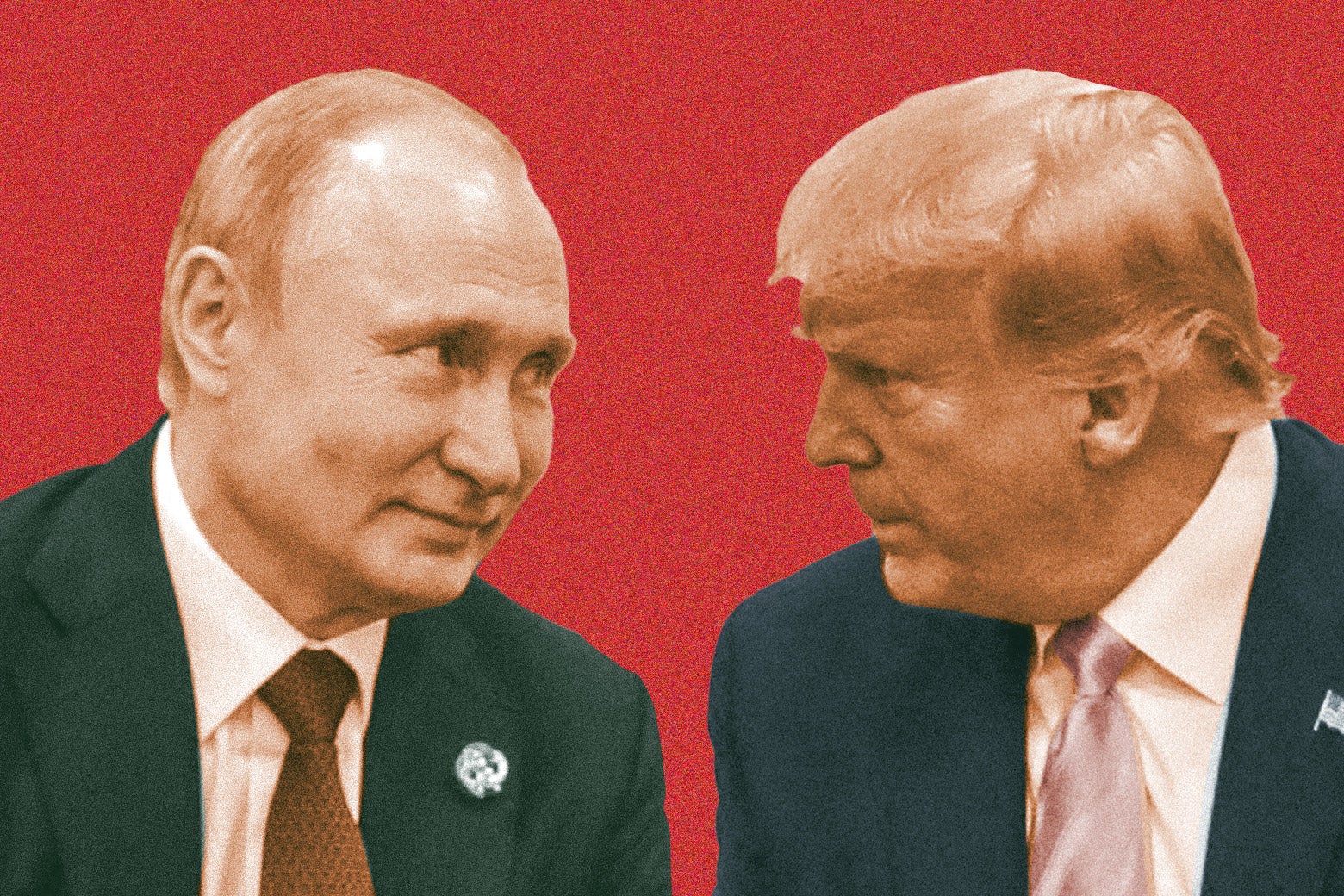Judge James Ho secured his spot on Donald Trump’s likely Supreme Court short list by staking out extreme, far-right positions that cleave to the MAGA movement’s goals. There’s really been only one glaring exception: Ho has long endorsed birthright citizenship, the constitutional guarantee that virtually everyone born on American soil automatically becomes an American citizen. The son of immigrants himself, Ho has written eloquently in support of this principle, refuting conservative arguments for its abolition. But Trump just won reelection on a promise to abolish birthright citizenship, and he seems unlikely to elevate a vocal foe of his own plan to the high court.
It should surprise no one, then, that less than a week after the election, Ho is already walking back his once-steadfast commitment to this fundamental right. In an interview with the conservative law professor Josh Blackman published on Monday, Ho sketched out his excuse to repudiate birthright citizenship by framing immigrants who lack permanent legal status as “invading aliens” whose children born on U.S. soil may be denied citizenship by states and the federal government. It is a strange and illogical claim with no basis in constitutional text or Supreme Court precedent. But Ho’s audience is not lawyers, journalists, or immigration experts; it’s Trump and his allies, whom he clearly seeks to convince of his total ideological commitment to MAGA. His backflip is yet another ominous confirmation that we should expect Trump’s next round of judges to not show even a glimmer of independence: They will be selected for their loyalty to the president’s agenda and spend the next four years auditioning accordingly.
Ho currently sits on the 5th U.S. Circuit Court of Appeals, which covers Texas, Louisiana, and Mississippi. It’s the most extreme appeals court in the country, an ultraconservative, brazenly partisan body that relentlessly reshapes the law in the Republican Party’s image, often going too far for even this very right-wing Supreme Court. Even among his reactionary colleagues, Ho stands out as a bomb thrower. On every conceivable issue, he takes the stance preferred by GOP hard-liners. He uses pugnacious, sometimes trollish oratory to present himself as Trump’s avatar on the bench, an unapologetic brawler who fights for ordinary people against woke liberals and condescending elites.
All these traits make Ho a perfect candidate for the Supreme Court under Trump’s second term. There’s just that one problem: On birthright citizenship, Ho has consistently bucked Trumpist orthodoxy. In 2006, while working in private practice, Ho wrote a concise, persuasive law review article defending the principle. Nearly a decade later, Ho transformed his article into a piece for the Federalist, a Trump-aligned media outlet. His message to the GOP seemed unmistakable: Birthright citizenship sits at the heart of the Constitution, and any attempt to revoke it would be an ill-fated betrayal of the 14th Amendment.
Ho’s argument aligns with the overwhelming consensus among legal scholars, historians, and courts. It flows directly from the 14th Amendment’s text and history. In drafting this amendment, Congress expressly intended to overturn Dred Scott, the odious 1857 decision that denied citizenship to Black Americans. The drafters of the amendment wanted to consign Dred Scott to the dustbin of history—not only by abolishing slavery, but also by compelling the government to forever recognize the equal citizenship of all people born in the U.S., so that no caste of “inferior” people could ever again be established. The 14th Amendment’s very first sentence therefore guarantees that “all persons born or naturalized in the United States, and subject to the jurisdiction thereof, are citizens of the United States and of the State wherein they reside.”
Congress excluded just three groups from this guarantee, each of whom fell outside the reach of American law: first, members of tribes that maintained separate sovereignty; second, foreign diplomats; and third, members of an invading army. Native Americans were considered members of “quasi foreign nations” and thus not fully subject to U.S. law. Diplomats and alien soldiers residing in the U.S. were deemed agents of a foreign state who held legal immunity from American law. So their children were not “subject to the jurisdiction” of the United States and could not acquire citizenship at birth.
Note who does not fall under these narrow exceptions: the U.S.-born children of immigrants, whether lawful or unauthorized. There is no indication from congressional debates that the 14th Amendment was intended to exclude immigrants—who are fully subject to U.S. law when present in the country—from birthright citizenship. And in 1898, the Supreme Court acknowledged that an individual born in the U.S. to noncitizen parents must still receive citizenship. Although the case involved an individual whose parents had traveled to the U.S. legally, no aspect of the court’s reasoning rested on this detail.
And so it has become a foundational American principle that the children of immigrants obtain automatic citizenship. This guarantee has allowed millions to become full participants in American democracy instead of foreigners to the only country they’ve ever known. And it stands as a bulwark against state efforts to discriminate against American citizens because their parents lacked permanent legal status. Revoking birthright citizenship would create a new underclass of young stateless people whom the government could deport to their parents’ country of origin—a place they may have never set foot in.
In his earlier writings, Ho cogently explained why the Constitution flatly forbids these dire consequences. Now it seems he has had a change of heart. In his interview, Ho sought to carve a massive loophole into the 14th Amendment. He assured Blackman, “Birthright citizenship obviously doesn’t apply in case of war or invasion. No one to my knowledge has ever argued that the children of invading aliens are entitled to birthright citizenship.” He likened these “invading aliens” to “unlawful combatants” captured after 9/11. “Everyone agrees,” Ho said, “that birthright citizenship doesn’t apply to the children of lawful combatants”—that is, alien soldiers invading the United States. “And it’s hard to see anyone arguing that unlawful combatants should be treated more favorably than lawful combatants.”
This statement might sound anodyne. But it is actually a shocking reversal of Ho’s own long-held beliefs. The judge is equating immigrants lacking legal status with terrorists by likening them to “unlawful combatants.” And he is arguing that, just as the government can deny citizenship to the children of terrorists, it can deny citizenship to the children of those immigrants.
The full scope of Ho’s about-face in Monday’s interview becomes clear only when read alongside a concurring opinion that he authored barely three months ago. In that concurrence, Ho declared that unauthorized immigration may qualify as an “invasion” under the Constitution akin to a foreign army storming over the border to wage war. The Constitution directs the federal government to protect states “against invasion” and allows states to defend themselves when “actually invaded.” It describes invasion in terms of “war” waged by a hostile power. Yet, according to Ho, the government may conclude that unauthorized migration constitutes an “invasion” and use force in response. Crucially, he argued that this decision was a purely “political question” for states, Congress, and the president to decide—meaning that courts cannot overrule their determination that an invasion exists.
This theory is wildly false and dangerous. And it has devastating implications for birthright citizenship, which Ho has now spelled out. His reasoning goes like this: The government may decide that immigrants who lack legal status qualify as “invading aliens.” The “children of invading aliens” do not receive citizenship under the 14th Amendment. So the U.S.-born newborns of those who have been declared “invading aliens” may no longer receive citizenship.
How exactly would this happen? Ho has sketched out the road map. The birthright-citizenship statute enacted by Congress largely mirrors the 14th Amendment and therefore includes the same exceptions. The president could, under Ho’s theory, announce that he believes that unlawful migration amounts to an invasion. He could then direct federal agencies to deny U.S. citizenship to all newborns of migrants. And the courts would be powerless to stop him, because they could not interfere with this “political question.”
Put simply, Ho has provided intellectual scaffolding to Trump’s promise to abolish birthright citizenship by executive order. He has laid out precisely what the president must do to deny U.S. citizenship to babies of migrants under his view of the law. In Monday’s interview, he tried to pass off this turnabout as obvious, as if he had believed it all along. But in his earlier writings, Ho took pains to state that all children born of migrants should receive citizenship, with no mention of this glaring exception that would nullify the rule. It sure looks as if he scrambled to develop this novel theory to assure Trump of his fealty and avoid getting bumped off the Supreme Court short list for his lone defection from MAGA.
SCOTUS is probably not yet extreme enough to embrace Ho’s theory. If Trump replaces even one liberal with a conservative like Ho, though, it could be. And in truth, the judge’s abrupt pivot on this issue, while shameless and cynical, is tactically wise. The GOP is disappointed in Trump’s first three justices, each of whom has deviated from the party line in some ways despite their overall hard-right ideology. Trump will be looking for loyalty above all else, and screening out any whiff of heterodox or independent thinking, from his next appointees. The smartest thing that short-listers can do right now is demonstrate that they’ll abandon any views that don’t align with Trump’s agenda, proving their lockstep compliance with the boss. It took Ho less than a week after the election to bend the knee.

















